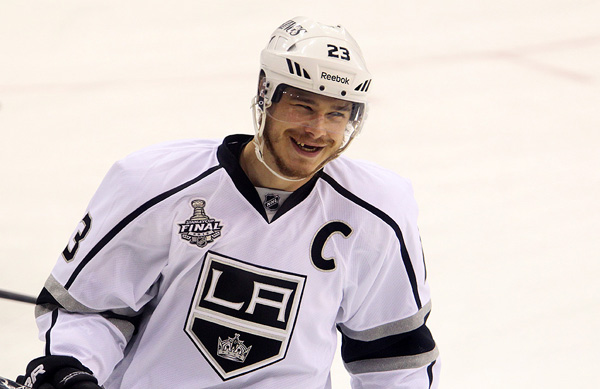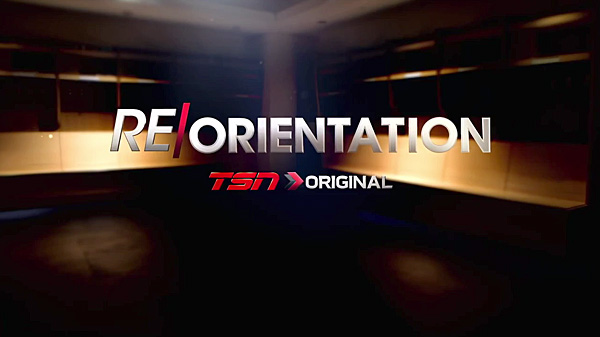Brownie points, or: Why LA is the best NHL team for a gay player
Brownie’s got your back.
And by you, I mean you. The gay one. The one we’ve been waiting for. And maybe things have evolved enough that at this point you’d be fine no matter where you played.
But here’s why you should come to Los Angeles.

Almost 40 years after NFL player Dave Kopay retired and then came out, a decade after Bravo turned its Queer Eye on schlubby straight guys—hell, five years after then-Leafs GM Brian Burke declared his unconditional love and support for his gay son, Brendan, there’s still not one current or past NHL player who has stood up and said, “I’m gay.” (Or, as Olympic diver Tom Daley said, that they “still fancy girls” but are dating a man. Or, like a growing number of actors or other entertainment celebs have told me in interviews, that they are mostly straight but also sometimes attracted to other guys, even if they’ve never done anything about it.)
That makes hockey the only (relatively) mainstream American male sport without at least one out-and-proud poster boy to trot around for the cameras.
It’s not for lack of possible subjects.


When TSN sent analyst and longtime NHL vet Aaron Ward out to produce a three-part story on homophobia in sports, they had a much harder time filling that hot seat on behalf of hockey than they did coming up with a suitable play on words to title the series:
There was Patrick Burke, eloquent as always, speaking on behalf of the You Can Play Project and in defense of his guesstimated 99 percent of players who aren’t homophobic in their hearts, even if sometimes it’s hard to tell. Gary Bettman lawyered his way through all the correct (and collectively bargained) talking points on behalf of the league, an extended version of which Outsports declared the longest on-record conversation with a commissioner of any major men’s sport to date.
Fine. Great. We’ll take it all. This is actually huge progress and I’m not even being sarcastic here.
But as Aaron Ward told SportsCentre host Rod Smith, after that they were all but shut out. “We struggled to get participation from players,” Ward said during the intro to his third and final segment, which aired last week.
“Over a nine-month period we reached out to 12 different National Hockey League teams,” Ward said. “Could not get cooperation. It was a struggle to get guys to sit down and be comfortable and honest in front of a camera.”
Nine months. Twelve clubs—and that’s out of 30 that have put forward at least one representative for You Can Play’s public campaigns.
All that work from TSN and You Can Play and everybody else who’s spoken out on the issue and there were only three players willing to go on-camera for anything more than the requisite “no of course we would never terrorize a gay teammate” soundbite:
1) Edmonton Oilers captain Andrew Ference, who appeared briefly in the series’ second clip.
2) Dearly departed Kings-to-Oilers goalie Ben Scrivens. (I’m only skipping over his very articulate comments here because Chanelle covered it a little and I have to display some kind of focus and also I’m still sad he’s gone.)
And, 3) Dustin Brown. Who is basically the best possible dude to have in your corner if you’re worried anyone might come at you on or off the ice with a shady attitude or a shitty agenda.
Here are some things our captain—“as tough as they come,” heralded Smith—needs you to hear:




Pretttttty straight-forward. Not terribly confrontational. Basically boils down to “don’t be an asshole,” which though I’ve never done serious time in a locker room I would imagine is probably the Golden Rule anyway.
So why couldn’t everybody say that?
I guess we should at least try giving those other guys the benefit of the doubt. “It’s obviously easy to sit down and read words for a PSA,” Ward said on the show. (I would actually pay a gazillion dollars if athletes could do that without looking they they’re struggling to remember how to read, period.) But, as Ward points out, “It’s an absolute other thing to sit down and be honest and in-depth and clear about how you feel about this process and this issue in its own right. It’s almost a barometer of where we are today.”
Why yes, Aaron, I’d agree it is almost a barometer of the frustrating it-gets-better-sometimes moment we’re experiencing right now, and not just in hockey.
Burke backs that up:
And we were definitely aware players were hesitant to sit down for longer interviews. Like Wardo said, guys weren't sure they could…
— Patrick Burke (@BurkieYCP) January 17, 2014
accurately express some of the nuance without misspeaking and getting themselves in trouble, so they passed. Disappointing but unsurprising.
— Patrick Burke (@BurkieYCP) January 17, 2014
I don’t entirely blame them. Sometimes the fight is a fair one—for example, this interview aired just as TSN’s American big brother belatedly began to realize they had a complete and total transphobic clusterfuck on their hands. Sometimes we just do a spectacular job of eating our own best allies (or own community) for lunch when they fuck up even a little. Right now most allies fighting homophobia in sports are still enjoying unicorn status—rare enough to be lauded almost unconditionally. Just ask Burke, who decried the movement’s reliance on straight allies when he handed over day-to-day control of You Can Play to ex-NFLer (and actual gay man) Wade Davis.
That said, I don’t think those other hockey players were primarily concerned with the gay elite schooling them on perfect spokesmanship. I think they’re still scared. Maybe for how it would impact their team, but probably mostly for their own career if they were seen not as one of many but a leading, perhaps strident voice for equality—either because that’s the assumption they’ve made, or that’s the not entirely insane idea they’ve gotten from their agents or sports media or other blunt, off-camera commentary they’ve heard. Which is, as Burke said, “disappointing but unsurprising.” So—enough about them.
Back to Brownie. Because he’s being pretty fucking awesome in this interview:
“I know people that are directly affected by this, that I’ve known my whole life and to be able to kind of stand up for them—it can make a big difference in the way it’s perceived. It’s just an opportunity to just be a part of something.”
He’s just really happy to be asked, you guys. Brown is clearly operating on a totally different—and yes, higher—level than your average presumed-straight dude.
Here’s a similarly thoughtful, insightful quote from Brown in one of TSN’s outtakes:
“Hockey players in general are very unselfish, and maybe that is the thought process—‘I don’t want to draw attention away from the team or the game.’ But I’d also like to think that hockey players in general are the type of guys who’ll back each other up.”
As far as I’ve seen, Ward hasn’t been more specific about why Ference and Scrivens and Brown were willing to sit down when others weren’t, other than a tweet giving some credit to the LA Kings PR team.
But here’s a clear indication of how easy I’d imagine it was for Brown to say yes:
“I just never really used those [homophobic] words to begin with, partly because I have friends that are gay, and you learn pretty quickly when you’re around them. That’s one of the best thing about it—if you have some friends that are gay, they are the first ones to say, ‘Hey, no big deal, but—here’s why you shouldn’t say that.’ But when you have someone that’s being affected on a daily basis, it hits home pretty quickly, and that’s what kind of happened for me.”
BRB, trying to figure out how to be Brownie’s new gay BFF.
And here’s a lesson he clearly learned the hard way, and by hard way I mean “surviving a locker room with Sean Avery”:

Despite Avery’s history, I have a weird respect for the now-reformed bully, who—since his time mocking Brown’s lisp (and wife) on a regular basis—has transformed himself into the kind of shit-stirrer I like most in an ally. (See for example: Avery’s recent disinterest in denying rumors he was secretly engaged to Bravo’s Andy Cohen.)
Until somebody in the league both comes out publicly and wants to be that face and voice—or, better for everyone involved, a number of players all come out in relatively quick succession—we in LA are especially lucky to have such an articulate captain.
If you have to pick a guy to be on your team—you as in you, the gay hockey player, or even we, the queer fans who really, really want to be able to take the NHL at its equal opportunity word (and please, please finally get on the Kiss Cam at Staples Center)—it’ll be very, very hard to do better than Brown.









To be fair, as a journalist, I can attest that a lot of athletes are as Burke noted – not frightened of showing support, but frightened of not speaking perfectly, or being misinterpreted. It’s amazing that so many of these guys, even for something as innocuous as a post-game comment, hide behind standard comments and cliches. But it’s understandable when a guy like Andrew Ference, who is a standout human being, he has been blasted in the past for saying what most people would agree is the “right thing.”